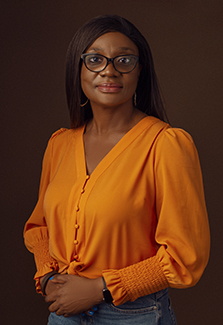Employing user-centered design to fill gaps in mental health treatment
November / December 2022 | Volume 21 Number 6

Dr. Lola Kola is a senior research fellow at University of Ibadan's WHO Collaborating Centre for Research and Training in Mental Health, Neurosciences and Drug and Alcohol Abuse. She also serves as adjunct associate professor at Lead City University, Nigeria. Prior to this, she earned master's and doctoral degrees in Medical Sociology at University of Ibadan. Kola partners on projects with the Behavioral Research in Technology and Engineering (BRiTE) Center at the University of Washington (UW) in Seattle and the Centre for Child and Adolescent Mental Health at University of Ibadan. Most recently she’s a Visiting Researcher in the Centre for Global Mental Health Department of Kings College London.
Why did you become a researcher?
My father, an engineer, always liked international news so I grew up learning about global issues, including health care. I can remember looking at the World Health Assembly as a young girl and, later, when I was in secondary school, I had actual dreams that I would be sitting there one day! Global health was not offered at my university, so I went for medical sociology. As time went on, I became more interested in mental health and, eventually, global mental health.
Before I started my Ph.D., I saw an opening at the WHO Collaborating Centre, so I applied and got the job. There, I coordinated large projects, including clinical trials and implementation studies, and I worked with senior researchers. Over time, I gained confidence and wanted to become a researcher myself. When you stick with something, your interest is reenforced and you get better at it. I love being a researcher and it's been very productive for me.
Tell us about your work.
I developed a mobile phone app as an adjunct treatment to routine primary care for adolescent mothers with depression. In Nigeria—and in many places—young mothers don't want to go to clinics because the nurses seem unkind: “You're pregnant but not married. Your mates are in school.” Because these teen mothers have depression, they may also have problems with personal care. Others shame them as “sluggish” or “lazy.” Not only do they feel social stigma from family members, nurses, neighbors and friends, they’ve disappointed themselves and feel self-stigma. Generally, they experience very low social support.
Seeing this, I thought,
How do I reach these girls? Originally, I planned in-depth interviews, but adolescents are sometimes not so trusting. They did not talk. Next, I brought them together in focus group discussions and then they couldn’t stop talking! There, I noticed nine out of 10 had mobile phones and I asked what they liked to do on them. They all liked watching short videos—funny skits, you know? This struck me as a possible area for innovation for my Emerging Global Leader award, which is supported by the National Institute of Mental Health (NIMH). So, applying user-centered design, my team created 14 short videos (with music the girls chose) to help them increase their engagement with care, while teaching them how to take care of their mental and physical health.
My evaluations showed that this adjunct treatment (adjunct to face-to-face clinical care) delivered through a mobile phone app helped the young mothers overcome problems related to stigma and improved treatment outcomes. We also found that relatives played an important role in supporting teen mothers’ uptake of digital tools.
What are your thoughts about global mental health?
I have been privileged to work with researchers and colleagues from the U.S., Canada, UK, Nepal, India, South Africa, Kenya, and the five Anglophone West African countries on several major projects. This experience shows me that all nations are “developing” when it comes to mental health.
The WHO classifies mental health as a noncommunicable disease (NCD). Yet no country contributes as much to mental health as to other NCDs. Not even the United States. Verbal commitments have been made to spend more, and during the worst of the pandemic, extra money was devoted to mental health. Yet the most recent WHO assessment shows that governments are not providing commensurate funds to mental health. It is considered less important than physical health, even though it clearly impacts other conditions and diseases.
What is Nigeria’s most urgent health issue?
Nigeria has an outdated mental health law known as the Lunacy Act of 1958. First enacted in 1916, this legislation was later amended in 1958, but it hasn’t been updated since then, despite several attempts by the mental health community. It is archaic! It uses the derogatory term “lunatics” to refer to mentally ill patients and it only acknowledges asylum-type care—it does not include rehabilitation of mentally ill patients within communities. I would go so far as to say that Nigeria faces a human rights emergency in mental health.
What’s ahead?
I worked with the WHO country office in Abuja, Nigeria, from 2011 to 2014 as a National Consultant for mental health and I coordinated the rollout of the WHO’s Mental Health Gap Action Programme (mhGAP) in the country. The mhGAP provides a framework for scaling up health interventions in non-specialist settings and this informs my own research today. I focus on developing digital psychosocial tools to increase patient access and to strengthen health systems. I’m part of a new project, supported by NIMH and co-led by my mentor, UW Professor Dror Ben-Zeev. WADMA or the West Africa Digital Mental Health Alliance aims to grow the next generation of regional researchers and clinicians designing tools for mental health care. Finally, I’m building my own team and increasing my international collaborative network so that I can move deeper into public health and apply for more competitive grants.
More Information
Updated February 27, 2025
To view Adobe PDF files,
download current, free accessible plug-ins from Adobe's website.
Related Fogarty Programs
Related World Regions / Countries
Related Global Health Research Topics